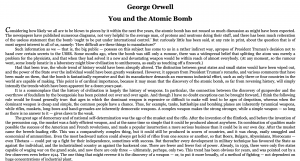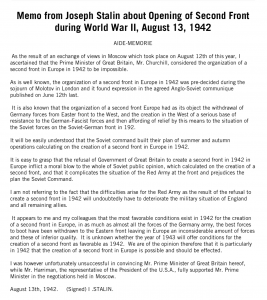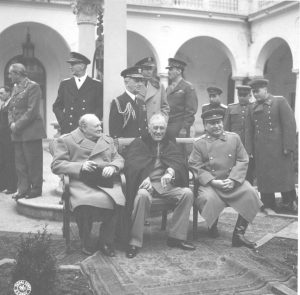George Orwell “You and the Atomic Bomb”

In George Orwell’s essay “You and the Atomic Bomb”, Orwell warns people that the atomic bomb will not only lead to the destruction of man himself but will also separate the world into three dominating powers. The creation of more advanced weapons in the form of the atomic bomb illustrates the rising power of the government and the increasing dominance they contain over the people. Although the consequences of the bomb were not known yet, Orwell understands that the atomic weapon inserts more power into the government and drives the people deeper under its control. This shows how much tension and fear people had after the atomic bomb was dropped in WWII.
Memo from Joseph Stalin, 1942

In August 1942, Roosevelt appointed W. Averell Harriman to represent the United States at a conference with British Prime Minister Winston Churchill and Soviet Union leader Joseph Stalin. The Moscow Conference sought a common understanding of Soviet and Anglo-American military plans. At the conference, Churchill delivered some unwelcome news. He told Stalin that western military planners had concluded that an Anglo-American invasion of Europe that year was “military folly.” The Soviets, however, wanted a “second-front” to relieve Nazi pressure. In response to Churchill, Stalin gave Harriman this memo, condemning the prime minister’s decision and arguing that British and American forces were capable of invading Europe in 1942.
Franklin D. Roosevelt, Winston Churchill, and Joseph Stalin During the Yalta Conference

The Yalta Conference took place in a Russian resort town in the Crimea from February 4–11, 1945, during World War Two. At Yalta, U.S. President Franklin D. Roosevelt, British Prime Minister Winston Churchill, and Soviet Premier Joseph Stalin made important decisions regarding the future progress of the war and the postwar world.The Allied leaders also discussed the future of Germany, Eastern Europe and the United Nations. Roosevelt, Churchill, and Stalin agreed not only to include France in the postwar governing of Germany, but also that Germany should assume some, but not all, responsibility for reparations following the war. The Americans and the British generally agreed that future governments of the Eastern European nations bordering the Soviet Union should be “friendly” to the Soviet regime while the Soviets pledged to allow free elections in all territories liberated from Nazi Germany. There was a sense of optimism once the Yalta Conference concluded, but that optimism did not last.
